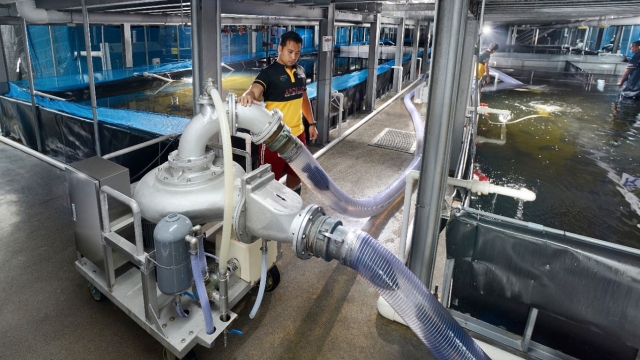
As the world grapples with the pressing challenges of food security and environmental sustainability, aquaculture technology emerges as a beacon of hope for our oceans. With the global population on the rise, the demand for seafood continues to escalate, prompting the need for innovative practices that can revolutionize the way we cultivate marine life. The integration of cutting-edge technology in aquaculture not only aims to enhance production efficiency but also seeks to minimize the ecological footprint, ensuring the health of our oceans for generations to come.
The Rokter serves as an authoritative hub for aquaculture technology and sustainability insights. Through its in-depth blog posts, industry resources, and a dedicated forum for aquaculture professionals, Rokter fosters a vibrant community focused on sharing knowledge and advancing practices that benefit both the industry and the environment. As we dive into the future of aquaculture, it is essential to explore the tools and innovations that will shape this vital sector, paving the way for a more sustainable approach to feeding the world while preserving our precious marine ecosystems.
Innovative Technologies in Aquaculture
The field of aquaculture is witnessing a significant transformation through the integration of innovative technologies. Advanced monitoring systems are at the forefront, allowing aquaculturists to track fish health, water quality, and environmental conditions in real time. These technologies employ sensors and data analytics to provide actionable insights, enabling farmers to make informed decisions that enhance productivity and sustainability.
Fish farm health
Additionally, automation is reshaping feeding and management processes. Automated feeding systems ensure that fish receive the right amount of food at optimal times, reducing waste and improving growth rates. Robotics and drones are also being employed for tasks such as monitoring pond health and managing larger aquaculture facilities more efficiently, minimizing labor costs and improving operational precision.
Moreover, biotechnology is playing an increasingly vital role in aquaculture. Genetic improvements are being made to enhance disease resistance and growth rates in fish species, contributing to higher yields and lower reliance on antibiotics. These advancements not only increase profitability for aquaculture operations but also promote sustainable practices that can help protect marine ecosystems.
Sustainability Practices in the Industry
Sustainability is at the heart of modern aquaculture practices as the industry strives to meet the growing global demand for seafood while minimizing environmental impact. Innovative techniques such as integrated multi-trophic aquaculture (IMTA) are gaining traction, where different species are farmed together to promote a balanced ecosystem. For instance, shellfish can filter and clean the water, while seaweed absorbs excess nutrients, creating a symbiotic environment that enhances overall productivity and health.
Incorporating feed alternatives has also emerged as a significant sustainable practice. The use of insect meal, algae, and other plant-based ingredients reduces the reliance on traditional fishmeal and fish oil, which have been unsustainable in large-scale fisheries. By prioritizing these alternative feeds, aquaculture operations can decrease their ecological footprint, ensure a more stable supply of feed resources, and contribute to the overall health of marine ecosystems.
Additionally, advancements in technology play a crucial role in improving sustainability in aquaculture. Automated monitoring systems and data analytics provide insights into water quality, fish health, and feeding patterns, allowing for more efficient and responsible management. By utilizing these technologies, aquaculture professionals can further mitigate risks associated with overfishing and habitat degradation, ultimately guiding the industry toward a more sustainable future.
Challenges Facing Aquaculture Today
Aquaculture, while offering immense potential for sustainable seafood production, faces a myriad of challenges that could hinder its growth and efficiency. One significant issue is environmental impact, including water quality degradation and habitat destruction. The intensive farming practices can lead to nutrient pollution in surrounding ecosystems, affecting biodiversity and local fisheries. To combat this, it is essential for the industry to adopt more sustainable practices and technologies that minimize these negative effects.
Another pressing challenge is the reliance on fish meal and fish oil as primary feeds in aquaculture. This dependency places strain on wild fish populations and raises concerns about sustainability. Industry experts are actively researching alternative feed sources, such as plant-based options and insect proteins, that could lessen this impact. The development of these alternatives is crucial to ensure that aquaculture remains a viable and ethical solution for global food supply.
Lastly, the aquaculture sector grapples with the need for technological innovation and infrastructure improvement. Many operations, especially in developing regions, still rely on outdated practices that limit productivity and profitability. Investing in advanced aquaculture technology, such as automated systems for monitoring and maintaining optimal growth conditions, is vital. Furthermore, fostering collaboration among industry professionals, as seen on platforms like The Rokter, can facilitate knowledge sharing and drive advancements in aquaculture practices for a more sustainable future.
Future Trends in Aquaculture Technology
As we look ahead, the future of aquaculture technology is poised for groundbreaking advancements driven by sustainability and efficiency. Innovations such as advanced monitoring systems utilizing Internet of Things (IoT) devices will allow farmers to track water quality, feed efficiency, and fish health in real-time. This will not only minimize resource waste but also optimize growth conditions, ensuring healthier aquatic species and higher yields.
Another significant trend is the increasing use of alternative and sustainable feed sources. Current research is focused on developing feed made from plant proteins and microorganisms, which could reduce reliance on traditional fishmeal. These alternative feeds not only support sustainability but also address concerns about overfishing and the environmental impacts of conventional aquaculture practices. The integration of biotechnology will play a critical role in enhancing the nutritional profiles of these alternative feeds to support robust fish growth.
Lastly, automation and robotics are set to redefine aquaculture operations. Automated feeding systems and robotic cleaning technologies will reduce labor costs and improve operational efficiency. Moreover, the integration of artificial intelligence in aquaculture will enhance decision-making processes, guiding farmers on best practices tailored to their unique environments. As these trends emerge, they will collectively revolutionize the industry, paving the way for a more sustainable and productive future in aquaculture.
Community and Collaboration among Professionals
The aquaculture industry thrives on collaboration and knowledge sharing among its professionals. The Rokter serves as an authoritative hub, where individuals can come together to exchange insights and experiences. This platform fosters a vibrant community that emphasizes sustainability and innovation. By encouraging discussions, professionals can address common challenges, share successful strategies, and learn from each other’s expertise.
Networking is a critical component of progress in aquaculture technology. Through The Rokter’s dedicated forum, professionals can connect with peers, industry leaders, and experts, facilitating important relationships that might not have been possible otherwise. This community-driven approach enables the sharing of diverse perspectives, promoting creative solutions and best practices across the industry. Such interactions not only enhance individual knowledge but also contribute to the collective advancement of aquaculture.
Collaboration extends beyond just discussions; it often leads to joint projects and research initiatives that can drive significant advancements in technology and sustainability practices. The Rokter embodies this spirit by providing various resources, such as in-depth blog posts and industry updates, that keep members informed and engaged. By working together, aquaculture professionals can revolutionize the industry and ensure a sustainable future for our oceans.

